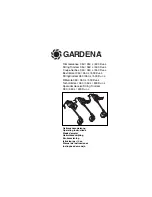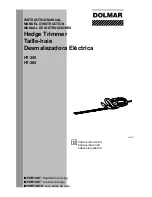
4
– Start the brush cutter/string trimmer only in accordance with the instructions.
Do not use any other methods to start the engine!
– Only use the brush cutter/string trimmer and tools for the specified purposes.
– Only start the brush cutter/string trimmer engine after the equipment is fully
assembled. Do not operate the equipment until all of the appropriate
accessories are attached!
– Before starting, make sure that the cutting tool is not in contact with hard objects
such as branches, stones etc. as the cutting tool will rotate when starting.
– Switch off the engine immediately if any type of engine problem occurs.
– Should the cutting tool hit stones or other hard objects, immediately switch off
the engine and inspect the cutting tool.
– Inspect the cutting tool at short regular intervals for damage (inspect for
hairline cracks using the tapping test).
– Only operate the brush cutter/string trimmer after attaching and adjusting the
shoulder strap to the correct length. The shoulder strap must be adjusted to
the user’s size and fastened to prevent fatigue during operation of the
equipment. Never hold the cutter with one hand during operation.
– During operation, always hold the brush cutter/string trimmer with both hands.
Always ensure you are on safe footing.
– Operate the brush cutter/string trimmer in such a manner as to avoid
inhalation of the exhaust gases. Never run the engine in an enclosed space
such as inside a room (risk of gas poisoning). Carbon monoxide is an odorless
gas.
– Always switch off the engine when resting, or if you intend to leave the brush
cutter/string trimmer unattended, and place it in a safe location to prevent
injury to other people and damage to the equipment.
– Never put the hot brush cutter/string trimmer onto dry grass or onto any other
combustible materials.
– The cutting tool must always be equipped with the appropriate guard.
Never run the cutter without this guard!
– All protective installations and guards supplied with the equipment must be
used during operation.
– Never operate the engine if the exhaust muffler is faulty.
– Shut off the engine during transport.
– When transporting the equipment, always attach the cover to the cutting
blade.
– Ensure the brush cutter/string trimmer is positioned safely during transport to
avoid fuel leakage.
– When transporting the brush cutter/string trimmer, ensure the fuel tank is
completely empty.
– When unloading the brush cutter/string trimmer from a truck or other such
vehicle, never drop the engine to the ground, as doing so may severely
damage the fuel tank.
– Unless in an emergency, never drop or cast the brush cutter/string trimmer to
the ground as doing so may severely damage the brush cutter/string trimmer.
– Always lift the entire equipment from the ground when moving it. Dragging the
equipment on its fuel tank is extremely dangerous and may cause fuel to leak,
which may cause fire.
– If the equipment gets heavy impact or fall, check the condition before
continuing work. Check the fuel system for fuel leakage and the controls and
safety devices for malfunction. If there is any damage or doubt, ask our
authorized service center for the inspection and repair.
Refuelling
– Shut off the engine during refuelling, keep away from open flames and do not
smoke during refuelling.
– Ensure mineral oil products do not come into contact with skin. Do not inhale
the fuel vapor. Always wear protective gloves during refuelling. Change and
clean protective clothing at regular intervals.
– To prevent soil contamination (environmental protection), make sure you do
not spill fuel or oil on the ground. If you do spill fuel, clean the brush cutter/
string trimmer immediately.
– Make sure fuel does not come into contact with your clothing. If fuel does
come into contact with your clothing, change your clothing immediately to
prevent fire.
– Inspect the fuel cap at regular intervals to make sure that it can be securely
fastened and does not leak.
– Carefully tighten the fuel tank cap. Once refuelling is complete, move to a
location at least 3 meters away from where you refuelled before starting the
engine.
– Never refuel in an enclosed space such as inside a room. Doing so may cause
an explosion due to the accumulation of fuel vapor at ground level.
• Resting
• Transport
• Refuelling
• Maintenance
• Tool Replacement





































